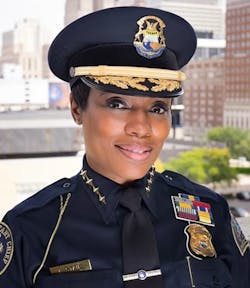By Lashinda Stair, 1st Assistant Chief, Detroit Police Department (retired), Senior Consultant, Public Safety Software, Motorola Solutions
Anyone who wears the badge, or has worn the badge, knows that it really is a badge of honor – the truest form of service that one can provide to their community. The men and women who choose to serve and risk their lives every day consistently prove that not all superheros wear capes – often they wear Blue.
I had the privilege of serving for more than 25 years with the City of Detroit’s Police Department, and during that time, I witnessed many changes in the role of women among those ranks of superheroes. In the Detroit Police Department today, approximately 26 percent of all law enforcement officers are women. For International Women’s Month, I spoke with five of my former colleagues in Blue from the Detroit Police Department:
I interviewed them to learn what unique perspectives they think women bring to law enforcement, the advice they would give to officers early in their careers about work/life balance, why they keep coming back to the job – even on their most difficult days, the changes they would make in law enforcement across the country if they held all the cards and the best advice they had ever received from a mentor in law enforcement.
Here are their thoughts….
What unique perspective do you think women bring to law enforcement?
Chief Elaine Bryant, Columbus (OH) Police Department
The unique perspective women bring to law enforcement is our communication skills, as well as our ability to empathize with a person going through a difficult situation, even if that person is violating the law. As women, we tend to treat people how we want our loved ones to be treated because we are nurturers by nature. Even if we are conducting an enforcement action, we always want to ensure that people have their dignity when we are addressing them. We also understand that our ability to use our intellect is key. We are never going to be stronger than a man, so it is extremely important that we are able to utilize our ability to communicate and our ability to make decisions that are not going to put us in compromising positions.
Commander Stacy Alvarado, Detroit Police Department
Women bring a perspective of calm and problem-solving to law enforcement that is really beneficial. I think it's very important to have different perspectives, and adding women into a career that has been male dominated has helped law enforcement evolve into a better service industry.
What advice would you give to people early in their law enforcement careers about work/life balance?
Deputy Chief DeShaune Sims, Detroit Police Department
It is important to nurture your whole self spiritually, mentally and physically – and look for ways to be involved in your community outside of law enforcement. Have friends who are not in law enforcement, so you get different perspectives on life. You don’t want to develop a “group think” about who you are and what you represent.
Also, I know sometimes it's difficult, but try not to take everything home with you. I believe strongly that if you have a spouse or someone close to you, communicate with them a lot about what you are experiencing so you don’t just internalize the things that you witness on a day to day basis given what we do for a living.
Lieutenant Starr Gonzales, Detroit Police Department
I encourage all of my students at the Detroit Police Academy to discover an outlet for themselves. It is important to have work-life balance. The biggest regret I have heard retired police officers share is that they missed precious moments with their families that cannot be replicated. For example, their child’s first base hit or recital. I applaud so many members in law enforcement for their dedication to serve our citizens; however, it is just as important to stay dedicated to our families. It is important to provide support for our families financially, but it is equally important to support them as they create memories. Again, it is important to find a balance between the two.
What happened on your worst day in law enforcement, and why did you keep going back to the job after that?
Commander Stacy Alvarado, Detroit Police Department
I don’t like to focus on my worst day at work. We have all experienced sad, tough, difficult moments and days. If we look at it from the perspective of how fortunate we are to have the great days, the awesome days and the days where we made a difference. Those days that aren’t so good help us to really appreciate those that are so good.
Lieutenant Starr Gonzales, Detroit Police Department
Early in my career, I responded to a deceased infant police call. We performed CPR, until EMS arrived. Upon further investigation, we discovered that the baby had drowned in a bucket that contained urine and cleaning solution. What brought me back then and continues to bring me back today is knowing that educating families on safety and prevention will help elevate further instances of preventable death. In addition, the ability to support my brothers and sisters in Blue, who may have challenges in processing such a traumatic scene. Knowing we can lean on the support of each other, chaplains and peer support, keeps us strong and dedicated to our mission.
If you held all the cards, what changes would you make in law enforcement across the country to secure better outcomes?
Chief Elaine Bryant, Columbus (OH) Police Department
I’d put more women in leadership roles for all the reasons I outlined in response to the first question. I think that would have a significant impact. Our male counterparts do a phenomenal job, but we bring something different to the table. I would create more race and gender diversity in police departments. It is extremely important for departments not only to reflect the communities in which they police, but also to have those different perspectives within their own department and be able to lean on someone else that has a different outlook. I’d encourage people to work with those unlike themselves, so they could have those different perspectives when they hit the streets. I’d provide more communication training – verbal judo/de-escalation training and create more community engagement opportunities for officers on the front lines. We do really well as executives, managers and supervisors in engaging with the public, but I think it is equally important that the officers who are doing day-to-day calls for service with the public have more opportunities to engage with the public when it isn’t a distress situation.
Deputy Chief DeShaune Sims, Detroit Police Department
If all of law enforcement could implement tenets of procedural justice that deal with fairness, transparency and allowing everyone involved in an encounter to have a voice and look for impartiality in the way we make our decisions, I think that would foster better relationships with our communities. It would give our citizens a way to let us know how we made them feel in an encounter and the officers a way to let them know how we perceive situations differently. When you have those open lines of communication, we all take back something we can do better and we learn from that. We don’t always realize the effect we have on our community when, for example, we make a traffic stop. In law enforcement, we may use certain terms or interact with someone in a way that the person is not used to. When we have open lines of communication and dialogue in an honest way, I think that goes a long way with the community.
What is the best advice a mentor ever gave you?
Chief Elaine Bryant, Columbus (OH) Police Department
Do not be complacent on the job. Move around in your assignments to become a more well rounded officer. I think that because of that advice, I’m sitting in the seat I am today because I allowed myself to be “uncomfortable.” I could have stayed in one position and allowed myself to be comfortable there, but I continued to move around because I wanted to learn different aspects of the job. I wanted to learn investigations, administration, patrol…I wanted to learn all of it. Because I did that, it put me in a position to be able to handle anything.
Sergeant Kyla Williams, Detroit Police Department
Never stop learning and achieving goals in law enforcement. Do not forget my upbringing. Stand my ground in whatever I believe in regardless of the circumstances or the outcomes.




